Emerging Research on Sleep and Nootropics
🧠 Introduction: Can Nootropics Help You Sleep Smarter?
When people hear the word nootropics, they often think of productivity, focus, and energy.
But what if the same compounds that enhance cognition could also help you sleep better — not just longer, but deeper and more restorative?
That’s the question scientists are beginning to explore.
For decades, sleep was viewed as the opposite of mental performance — rest versus productivity. But modern neuroscience shows the two are inseparable. Sleep is when the brain:
Repairs neurons
Consolidates memories
Clears toxins
Rebalances neurotransmitters like GABA, dopamine, and serotonin
Now, researchers are investigating how nootropic compounds — substances that enhance brain function — can also support these nighttime processes.
In this in-depth article, we’ll cover:
🌙 The brain’s repair mechanisms during sleep
🧬 How specific nootropics affect sleep quality and recovery
🧠 Compounds that balance neurotransmitters for rest and cognition
⚡ Which nootropics to avoid before bed (and why)
🔬 Cutting-edge research connecting memory, neuroplasticity, and sleep
Let’s explore the evolving intersection between sleep optimization and cognitive enhancement.
Looking for supplements for This? Click here.
🌙 Part 1: Sleep as the Brain’s Restoration System

Sleep isn’t a passive state — it’s a biological symphony of repair, memory consolidation, and detoxification.
🧬 The Glymphatic System — The Brain’s Nighttime Cleanse
During deep sleep, cerebrospinal fluid flushes through the brain, clearing waste products like beta-amyloid (linked to Alzheimer’s).
This process, known as the glymphatic system, increases by up to 60% during sleep.
Disrupted sleep means incomplete cleanup — leading to brain fog, irritability, and cognitive decline.
Nootropics that improve circulation, antioxidant capacity, or mitochondrial efficiency may enhance this natural cleansing process.
🧠 Memory Consolidation
Sleep strengthens connections formed during the day.
During REM sleep, emotional memories are integrated; during slow-wave sleep, factual and motor learning solidify.
That’s why pulling an all-nighter or sleeping poorly dramatically reduces retention.
Some nootropics, such as choline donors and adaptogens, appear to enhance REM stability and synaptic plasticity — key for memory formation.
⚡ Neurotransmitter Reset
Throughout the day, stress, caffeine, and overstimulation deplete calming neurotransmitters like GABA and serotonin.
Deep sleep restores their balance — while overactive glutamate signaling is dialed down.
Nootropics that modulate this balance (e.g., L-theanine, magnesium threonate, taurine) can improve both mental focus and sleep quality by supporting GABAergic tone.
🧩 Part 2: The Nootropic–Sleep Connection
Nootropics are substances that enhance cognitive performance, neuroprotection, or brain metabolism — but many also affect sleep-regulating pathways.
Let’s look at the most promising categories backed by current research.
🌿 1️⃣ Adaptogens: Regulating the Stress–Sleep Axis
Adaptogens help the body adapt to stress and normalize cortisol rhythms.
🪷 Ashwagandha (Withania somnifera)
One of the best-studied adaptogens for both cognition and sleep.
Lowers cortisol and anxiety
Improves sleep efficiency and non-REM duration
Enhances daytime alertness
💊 Dose: 300–600 mg extract (KSM-66® or Sensoril®).
🌿 Rhodiola rosea
Reduces fatigue without overstimulation
Supports serotonin and dopamine balance
Best taken early in the day to prevent nighttime wakefulness.
💊 Dose: 200–400 mg standardized extract.
🍇 Schisandra chinensis
Regulates circadian rhythm
Enhances oxygen utilization and deep sleep recovery
May improve sleep under stress or jet lag.
💊 Dose: 250–500 mg extract.
🧬 2️⃣ Amino Acid Nootropics: Neurotransmitter Balance
🍵 L-Theanine
A calming amino acid found in green tea.
Promotes alpha brain waves (relaxed focus)
Increases GABA, dopamine, and serotonin
Improves sleep onset without sedation
💊 Dose: 200–400 mg, evening or before bed.
🧠 Bonus: Enhances the effects of magnesium or GABA supplements.
🌙 Glycine
Lowers core body temperature for deeper sleep
Improves sleep quality and morning alertness
May enhance memory consolidation during slow-wave sleep
💊 Dose: 3 g before bed (powder in warm water).
🧘 Taurine
A sulfur-based amino acid with both nootropic and calming effects.
Regulates GABA and glycine receptors
Lowers stress-induced cortisol
Supports healthy REM–non-REM balance
💊 Dose: 500–1000 mg in the evening.
Looking for supplements for This? Click here.
🧠 3️⃣ Choline and Phospholipid Donors: Brain Fuel and REM Support
Choline-based nootropics improve acetylcholine, the neurotransmitter responsible for memory, learning, and REM sleep regulation.
🧬 Alpha-GPC (L-Alpha-glycerylphosphorylcholine)
Boosts acetylcholine and brain phospholipids
Enhances REM sleep density and dream vividness
Supports neuroplasticity
💊 Dose: 300–600 mg daily (morning preferred).
🧬 Phosphatidylserine (PS)
Regulates cortisol and improves stress adaptation
Supports cell membrane repair during sleep
May reduce nighttime awakenings due to anxiety
💊 Dose: 100–300 mg before bed.
🧬 4️⃣ Magnesium L-Threonate — The Neuroplasticity Mineral
Magnesium threonate uniquely crosses the blood–brain barrier and boosts synaptic density.
Calms the nervous system
Enhances memory formation during sleep
Improves deep sleep stages (slow-wave cycles)
💊 Dose: 1–2 g providing ~140 mg elemental magnesium.
🧠 Bonus: Works synergistically with L-theanine and taurine.
🌿 5️⃣ Botanical Nootropics for Sleep Regulation
🌺 Saffron (Affron® Extract)
Increases serotonin and melatonin production
Reduces anxiety and rumination
Improves overall sleep quality in mild insomnia
💊 Dose: 15–30 mg daily.
🌿 Lemon Balm (Melissa officinalis)
Enhances GABA transmission
Reduces restlessness and muscle tension
Supports calm alertness by day and relaxation by night
💊 Dose: 300–600 mg standardized extract.
🌸 Magnolia Bark (Honokiol + Magnolol)
Activates GABA-A receptors
Reduces cortisol and stress-induced insomnia
Supports both non-REM and REM balance
💊 Dose: 200–400 mg before bed.
🧬 6️⃣ Nootropics for Circadian Rhythm Regulation
🌞 Nicotinamide Riboside (NR) and NAD+ Boosters
These compounds influence mitochondrial energy and circadian gene expression.
Synchronize the suprachiasmatic nucleus (SCN) — the brain’s internal clock
May reduce jet lag or shift-work fatigue
💊 Caution: Take in the morning — evening use may delay melatonin release.
🌿 Pterostilbene and Resveratrol
Natural compounds that activate SIRT1 genes, improving metabolic balance and potentially circadian rhythm alignment.
Benefits:
Protects neurons from oxidative stress
Enhances deep sleep regulation indirectly via mitochondrial support
💊 Dose: 50–150 mg combined with meals.
🧘 Part 3: Sleep Recovery and Nootropic Synergy
💤 The Brain’s “Restorative Stack”
The best nootropic combinations for sleep support balance calmness, neurotransmission, and neuroprotection.
Here are research-inspired stacks based on purpose 👇
🌿 1️⃣ For Stress-Induced Insomnia
| Ingredient | Purpose |
|---|---|
| Ashwagandha (300 mg) | Reduces cortisol |
| L-Theanine (200 mg) | Calms racing thoughts |
| Magnesium threonate (140 mg elemental) | Supports GABA receptors |
| Glycine (3 g) | Lowers body temperature |
✅ Best for: People with high stress or cortisol-driven sleep issues.
🌙 2️⃣ For Light Sleepers with Frequent Awakenings
| Ingredient | Purpose |
|---|---|
| Phosphatidylserine (200 mg) | Cortisol regulation |
| Magnolia bark (300 mg) | Extends deep sleep |
| Taurine (1000 mg) | Balances REM–non-REM cycles |
✅ Best for: Those waking up between 2–4 a.m. with an active mind.
🧠 3️⃣ For Memory and Cognitive Recovery During Sleep
| Ingredient | Purpose |
|---|---|
| Alpha-GPC (300 mg) | Acetylcholine support |
| Saffron (15 mg) | Serotonin–melatonin rhythm |
| Magnesium L-threonate | Synaptic repair |
| Omega-3 (1 g EPA+DHA) | Neural membrane flexibility |
✅ Best for: Students, creatives, or professionals seeking better cognitive restoration.
⚡ 4️⃣ For Jet Lag or Shift Work
| Ingredient | Purpose |
|---|---|
| Schisandra (400 mg) | Circadian adaptation |
| NAD+ precursor (NR or NMN) | Aligns cellular clock |
| Glycine (3 g) | Restores sleep architecture |
| Tart Cherry Extract | Natural melatonin source |
✅ Best for: Frequent travelers or late-night workers.
Looking for supplements for This? Click here.
🧬 Part 4: What to Avoid — Nootropics That Disrupt Sleep

Not all cognitive enhancers are sleep-friendly. Some extend alertness well past bedtime.
❌ Caffeine and Theacrine
Both block adenosine, preventing sleep pressure.
Even morning doses can reduce deep sleep later.
❌ Modafinil and Adrafinil
Wakefulness-promoting drugs that increase dopamine and histamine activity — beneficial for alertness, harmful for sleep if misused.
❌ Racetams (e.g., Aniracetam, Phenylpiracetam)
Enhance focus and memory via glutamate modulation.
Some users report insomnia or vivid dreams if taken late.
❌ Nicotine or Yohimbine
Stimulants that increase heart rate and adrenaline — best avoided after noon.
🌿 Part 5: Cutting-Edge Research — Sleep, Neuroplasticity, and Nootropics
Emerging science is exploring how sleep and nootropics interact at the molecular level.
🧬 1️⃣ BDNF and Sleep Depth
Brain-Derived Neurotrophic Factor (BDNF) is essential for memory and neuroplasticity.
Deep sleep boosts BDNF, while stress and sleep loss lower it.
Certain nootropics — like L-theanine, omega-3s, ashwagandha, and magnesium threonate — have been shown to raise BDNF levels, potentially improving both cognitive and sleep quality outcomes.
🧠 2️⃣ Mitochondrial Function and Energy Balance
The brain consumes 20% of body energy, much of which goes into cellular repair during sleep.
Compounds like CoQ10, PQQ, and acetyl-L-carnitine may enhance mitochondrial efficiency, reducing oxidative stress and supporting smoother circadian recovery.
🌙 3️⃣ The Gut–Brain Axis and Sleep Regulation
The gut microbiome produces neurotransmitters like serotonin and GABA — crucial for sleep regulation.
Prebiotic nootropics such as inulin and resistant starch are being studied for their role in improving sleep through gut–brain signaling.
🧘 4️⃣ Neuroinflammation and Sleep Disorders
Inflammation disrupts sleep by impairing melatonin synthesis and increasing cortisol.
Nootropics with anti-inflammatory and antioxidant properties — such as curcumin, resveratrol, and saffron — show promise in restoring normal sleep cycles by reducing microglial activation in the brain.
🌈 Part 6: Integrating Nootropics Into a Sleep Routine
Even the most advanced nootropics work best when paired with consistent sleep hygiene.
Here’s a model nighttime protocol combining behavioral and nutritional science:
🕯️ 1–2 Hours Before Bed:
Dim lights, switch to warm color spectrum
Take magnesium + L-theanine
Stretch or journal to offload stress
🌿 30 Minutes Before Bed:
Take glycine or taurine
Drink herbal tea (lemon balm or magnolia)
Avoid screens and strong light
🌙 At Bedtime:
Keep room cool (18–20°C / 65–68°F)
Use white noise or calming sound
Practice 4-7-8 breathing
🌅 Morning Reset:
Get sunlight exposure
Move your body
Take daytime nootropics (Rhodiola, Alpha-GPC, Omega-3s) only after waking fully
🩵 Part 7: Realistic Expectations and Cautions
Nootropics can optimize sleep quality, not replace healthy rhythms.
Be aware that:
Sleep improvement takes consistency (2–3 weeks)
More ingredients ≠ better results
Mixing too many compounds can overload pathways
Individual responses vary based on stress, age, and hormones
Always consult a healthcare professional if you’re on medications (especially SSRIs, stimulants, or sleep aids).
🌠 Final Thoughts: Smarter Sleep, Sharper Mind
The frontier of sleep and nootropics reveals a profound truth:
Cognitive enhancement starts with rest.
The best “smart drugs” don’t just boost focus — they nurture the biological foundation of intelligence: deep, restorative sleep.
By combining gentle nootropics, adaptogens, and sleep-friendly amino acids, you can align your body’s natural rhythms for both nighttime recovery and daytime clarity.
You don’t just wake up — you reboot. 🌙💤
Looking for online therapy ? Click Here.
📚 References
Walker, M. Why We Sleep. Scribner, 2017.
Langade, D. et al. “Ashwagandha Root Extract and Sleep Quality.” Cureus, 2020.
Kimura, K. et al. “L-Theanine Reduces Psychological and Physiological Stress Responses.” Biological Psychology, 2007.
Wienecke, E. et al. “Magnesium and Sleep Quality.” J. Res. Med. Sci., 2016.
Peuhkuri, K. et al. “Diet and Sleep: Nutrients and Sleep Regulation.” Nutrients, 2012.
Lopresti, A. et al. “Saffron and Mood–Sleep Regulation.” Journal of Clinical Sleep Medicine, 2019.
Sarris, J. et al. “Herbal and Nutritional Sleep Aids.” Phytotherapy Research, 2020.
Panossian, A. et al. “Adaptogens in Stress-Induced Insomnia.” Phytomedicine, 2021.
Huberman, A. “Tools for Sleep, Focus, and Neuroplasticity.” Huberman Lab Podcast, 2023.
Bjorvatn, B. et al. “Mitochondrial and Circadian Mechanisms in Sleep Regulation.” Sleep Medicine Reviews, 2020.
Related Posts
-

How to Measure Your Emotional Growth Over Time
Emotional growth can’t be measured on a scale — but it can be tracked through awareness, regulation, and reflection. Learn how to monitor your emotional evolution using journaling, biofeedback, and science-backed metrics for real progress. 💫
-

The Connection Between Creativity and Resilience
Creativity and resilience share the same roots — adaptability, flexibility, and imagination. Learn how creative expression rewires your brain for strength, helping you transform stress into growth through neuroscience, art, and self-reflection. 🌿
-

Why Cycling Supplements May Improve Long-Term Resilience
Your body adapts to everything — even supplements. Discover why cycling your supplements helps prevent tolerance, boost energy naturally, and build lasting resilience by aligning with your body’s biological rhythms. 🌿
-

The Role of Biofeedback in Emotional Strength
Learn how biofeedback bridges mind and body — helping you monitor heart rate, breath, and brain activity to build emotional strength, resilience, and calm under pressure. See how science meets mindfulness for lasting control. 🌿
-

How to Stay Strong During Long-Term Stress
Long-term stress doesn’t just drain your energy — it rewires your biology. Discover science-backed ways to strengthen your body, balance your mind, and build lasting resilience through breathwork, nutrition, mindset shifts, and supplements that restore calm and focus. 💪
-

Resilience Training for Entrepreneurs
Entrepreneurship isn’t just about strategy — it’s about stamina. Discover how resilience training helps founders stay calm, clear-headed, and adaptable under pressure through neuroscience-backed habits, emotional regulation, and smart supplementation. 🌿
-

How Nootropics Can Boost Emotional Control
Emotions don’t have to control you. Discover how nootropics like L-theanine, ashwagandha, saffron, and omega-3s help balance brain chemistry, improve focus, and strengthen your ability to stay calm and composed under stress. 🌿
-

Stacking Adaptogens for Maximum Resilience
Adaptogens are nature’s stress shield — helping you stay calm, energized, and clear even under pressure. Learn how to stack herbs like ashwagandha, rhodiola, reishi, and schisandra for maximum resilience, balance, and long-term vitality. 🌿
-
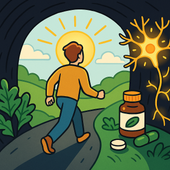
Post-Traumatic Growth and Supplements That Support It
After trauma, true healing means more than survival — it’s transformation. Learn how post-traumatic growth happens in the brain and body, and explore natural supplements like magnesium, ashwagandha, saffron, and omega-3s that support resilience, clarity, and emotional repair.
-
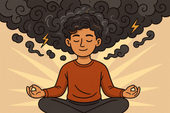
How to Regain Focus After Emotional Stress
After emotional stress, your nervous system feels frayed — your focus fades, thoughts race, and calm seems impossible. Learn how to restore balance, rebuild concentration, and retrain your brain for clarity and peace through evidence-based mind–body tools. 🌿
-
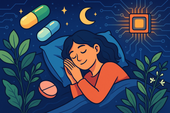
The Future of Sleep Supplements
The future of sleep supplements is here — where science meets nature. Discover how next-generation formulas use adaptogens, amino acids, and biotech innovations to support deep, restorative sleep without dependency. 🌙
-

New Herbal Extracts for Deep Sleep
Discover the next generation of herbal extracts for deep sleep — from saffron and magnolia to jujube and lemon balm. Learn how these plant-based compounds calm the nervous system, balance cortisol, and promote truly restorative rest. 🌙
-
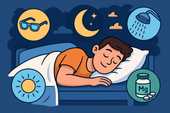
Sleep Biohacking: What Works and What Doesn’t
Biohacking your sleep can sound futuristic — from red light therapy to wearables and supplement stacks. But which hacks actually help, and which are just hype? Discover the science-backed sleep strategies that truly improve rest, recovery, and brain health. 🌙
-
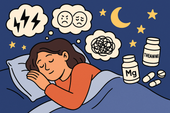
Sleep Support for People with Anxiety Disorders
💭 A restless mind can keep you up all night — thoughts spinning, heart racing, and peace feeling far away. Learn how to quiet overthinking, regulate your nervous system, and create a nightly ritual that teaches your brain to let go and rest deeply. 🌙
-
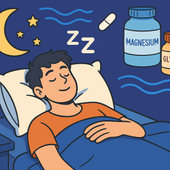
How to Fall Back Asleep After Waking Up
Waking up in the middle of the night? Learn how to fall back asleep quickly and calmly using breathing techniques, stress-reducing rituals, and natural supplements like magnesium and glycine. Restore your body’s rhythm and wake up feeling refreshed.
-
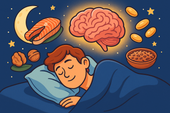
The Role of Omega-3s in Sleep Quality
-
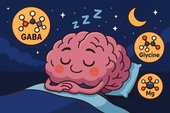
Stacking GABA and Glycine for Deeper Rest
Discover how stacking GABA and glycine can help you achieve deeper, more restorative sleep. Learn how these calming amino acids work together to relax your mind, soothe your body, and improve overall sleep quality—naturally and safely.
-

Overcoming Jet Lag with Supplements
✈️ Jet lag doesn’t have to ruin your trip! Discover how supplements like melatonin, magnesium, L-theanine, and tart cherry can help you reset your body clock faster, reduce fatigue, and recover energy naturally after long flights. 🌙
-
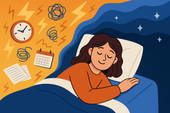
Managing Sleep During Times of Stress
Feeling wired and restless? Learn how to manage sleep during stressful times through nutrition, breathwork, and natural supplements like magnesium and L-theanine. Discover how to calm your nervous system and restore deep, peaceful rest—even when life feels overwhelming.
-

The Role of Magnesium for Night Cramps
Night cramps keeping you awake? Discover how magnesium helps relax muscles, balance electrolytes, and prevent painful spasms. Learn which forms work best, how to take them, and how to pair them with other nutrients for cramp-free, peaceful sleep.
-
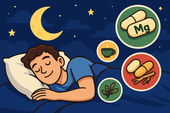
Supplements That Reduce Nighttime Awakenings
🌙 Discover science-backed supplements that help you stay asleep through the night. From magnesium and L-theanine to glycine and ashwagandha, learn how these natural compounds calm your nervous system, balance cortisol, and prevent 2 a.m. wake-ups for deeper, more restorative rest.
-

Nootropics That Promote Calm and Rest
Explore the world of calming nootropics — natural brain enhancers that promote relaxation, better focus, and deeper rest. Learn how L-Theanine, magnesium, ashwagandha, and other adaptogens help balance your nervous system, reduce stress, and support restorative sleep.
-

Best Natural Supplement Stack for Sleep
Discover the best natural supplement stack for deep, restorative sleep. Learn how nutrients like magnesium, L-theanine, glycine, and calming herbs such as chamomile and ashwagandha work together to relax your body, calm your mind, and improve sleep quality—naturally and safely.
-

Combining L-Theanine and Magnesium for Sleep: A Calm Night, Naturally
Discover how combining L-Theanine and Magnesium can help you drift into deep, restorative sleep. Learn how this natural duo calms the mind, relaxes the body, and supports your nervous system—without grogginess the next morning.
-

How to Sleep Better After Intense Workouts
Struggling to fall asleep after a tough workout? Learn how to optimize your post-training recovery with nutrition, hydration, and science-backed sleep strategies. Discover how to calm your nervous system, balance hormones, and wake up fully recharged for your next session.
-

Ashwagandha and Valerian: A Bedtime Combo for Deep Rest and Emotional Reset
Discover the calming synergy of Ashwagandha and Valerian root, two natural sleep aids that help quiet the mind, ease anxiety, and promote deeper rest. Learn how this herbal duo supports the nervous system, balances stress hormones, and restores emotional peace — without next-day grogginess.
-

How to Create a Resilience-Boosting Diet
Discover how to build emotional and physical strength from the inside out with a resilience-boosting diet 🍎. Learn which foods stabilize your mood, how supplements like magnesium and omega-3s strengthen your stress response, and why pairing nutrition with breathwork and therapy creates lasting calm, focus, and vitality 🌿💪.
-

Best Teas and Herbal Blends for Calmness: Nature’s Way to Restore Inner Peace
Ashwagandha, the ancient adaptogenic herb, helps your body find balance during stress. Known as “Indian ginseng,” it supports cortisol regulation, boosts energy, and restores calm clarity. Discover how this powerful root promotes resilience, emotional balance, and steady vitality — one cup at a time. 🌸
-

Parenting and Emotional Strength: How to Raise Children Without Losing Yourself
Empathy is the bridge that connects hearts — the quiet power to understand, feel, and support another’s emotions without judgment. Learn how empathy strengthens relationships, enhances communication, and cultivates deeper compassion in everyday life. 🌿
-

How to Bounce Back from Public Failure: Reclaiming Confidence, Purpose, and Power
Visualization is more than imagination — it’s brain training for resilience. By picturing calm, success, or healing, you activate the same neural pathways as real experience. Learn how daily visualization rewires your brain for confidence, emotional balance, and recovery from stress. ✨
-

Coping with Financial Stress Through Resilience: How to Stay Grounded When Money Feels Tight
Body awareness is the foundation of emotional resilience. By tuning into your body’s signals — tension, fatigue, or calm — you learn to recognize stress before it overwhelms you. Discover how mindfulness, gentle movement, and breathwork can deepen your connection with your body and restore balance from the inside out. 🧘
-

How to Stay Positive During Chronic Illness: A Guide to Emotional Strength and Hope
Creativity is more than art — it’s a form of healing. Whether through painting, writing, music, or small acts of expression, creativity helps release emotion, calm the nervous system, and reconnect you to joy. Discover how to use creativity as a tool for emotional balance, resilience, and self-discovery. 🌿
-

Resilience Tips for Caregivers: How to Stay Strong While Caring for Others
Joy isn’t the absence of pain — it’s the quiet strength to find light even in challenging times. Cultivating joy through small daily moments restores balance, releases stress, and reminds you of life’s beauty. Learn how to reconnect with authentic happiness, rebuild emotional energy, and nurture your nervous system through gratitude, presence, and play. 🌿
-

Building Resilience After a Breakup: How to Heal, Rebuild, and Rise Stronger
Social connection is one of the strongest predictors of emotional resilience. During difficult times, genuine relationships act as anchors — calming the nervous system, reducing stress hormones, and helping you regain perspective. Learn how cultivating real human connection can strengthen your mind, heart, and overall well-being. 🌿
-

How to Stay Emotionally Strong During Job Loss
Your emotions are powered by brain chemistry — a delicate balance of neurotransmitters like serotonin, dopamine, and cortisol. When these chemicals work in harmony, you feel calm, focused, and resilient. Learn how daily habits, nutrition, and mindfulness can support your brain chemistry and boost emotional well-being naturally. 🌿
-

The Role of Hormones in Emotional Stability: How Your Chemistry Shapes Your Calm
Hormones shape more than your body — they shape your emotions, resilience, and sense of calm. From cortisol to serotonin, these chemical messengers influence how you react to stress, connect with others, and recover from challenges. Learn how to balance your hormones naturally to build lasting emotional stability and harmony within. 💫
-

Mitochondria and Emotional Energy: The Cellular Power Behind Your Mood
Breathwork is one of the most powerful tools for emotional regulation and cellular balance. Through intentional breathing, you can calm your nervous system, increase oxygen flow to the brain, and even support mitochondrial energy. Learn how conscious breathing connects body and mind — transforming stress into presence and emotional strength. 🌿
-

Inflammation and Its Impact on Mood Resilience: The Silent Link Between Body and Mind
Inflammation doesn’t just affect the body — it impacts the mind. Chronic inflammation alters brain chemistry, depletes serotonin, and makes emotional recovery harder. Learn how calming inflammation through nutrition, mindfulness, and sleep can restore balance, resilience, and a renewed sense of emotional strength. 💫
-

How Antioxidants Protect Emotional Well-being: The Hidden Link Between Oxidative Stress and Mental Health
Antioxidants do more than protect your body — they defend your mind. By neutralizing oxidative stress, antioxidants support serotonin, dopamine, and brain energy pathways that keep you calm, focused, and emotionally balanced. Discover how foods like berries, green tea, and dark chocolate nourish your brain, boost mood, and strengthen resilience from the inside out. 🌿✨
-

The HPA Axis and Emotional Health: The Hidden Bridge Between Stress and Mind
Neuroplasticity — the brain’s ability to rewire and adapt — is the foundation of emotional healing and resilience. When you face stress, trauma, or change, your neural pathways can reshape themselves to support new patterns of calm, focus, and self-awareness. Learn how daily practices like mindfulness, therapy, and breathwork strengthen neuroplasticity to transform emotional pain into personal growth. 🌸
-

Why Cortisol Control Is Key to Resilience: Mastering Stress to Build Emotional Strength
Controlling cortisol — the body’s main stress hormone — is the secret to lasting resilience. When cortisol levels stay balanced, your mind becomes clearer, emotions steadier, and energy more sustainable. Learn how breathwork, mindset shifts, adaptogens, and daily rhythms can help you calm your stress response and build true inner strength. 🌞💪
-

Dopamine’s Influence on Motivation and Recovery: Reigniting Drive and Balance
Healthy relationships are the foundation of emotional balance and resilience. Whether romantic, familial, or platonic, genuine connection releases dopamine, serotonin, and oxytocin — the brain’s “bonding trio” — helping us feel secure, motivated, and seen. Learn how trust, empathy, and communication not only strengthen your connections but also reshape your nervous system for deeper emotional well-being. 🌿🤝
-

The Role of Serotonin in Resilience: How This “Mood Molecule” Shapes Emotional Strength
Serotonin — often called the “resilience molecule” — plays a vital role in how we handle stress, regulate mood, and recover from emotional challenges. Beyond happiness, this powerful neurotransmitter helps balance the gut-brain axis, stabilize the nervous system, and support emotional flexibility. Learn how nutrition, sunlight, mindfulness, and adaptogens can naturally boost serotonin and strengthen your emotional resilience. 🌞🧠
-

How Neuroplasticity Supports Emotional Growth: Rewiring the Brain for Resilience
Neuroplasticity is the brain’s built-in power to grow, adapt, and heal — and it’s the foundation of emotional transformation. Every mindful breath, compassionate act, or reframed thought strengthens new neural pathways that support resilience and self-awareness. Learn how your brain rewires through daily habits, helping you turn emotional challenges into opportunities for growth and calm. 🌿
-

Tai Chi and Adaptogens for Mind-Body Balance: The Art of Harmonizing Energy and Resilience
Alchemy isn’t just an ancient science — it’s a timeless symbol of transformation and inner balance. By blending the physical and spiritual, alchemy teaches us that change begins from within. Just as metals are refined into gold, we too can transmute emotional pain, stress, and chaos into clarity and strength through mindful practice and self-awareness. 🌙✨
-

Cold Therapy and Emotional Control: Training the Mind Through the Body
Cold therapy isn’t just for athletes — it’s a tool for emotional mastery. By exposing your body to controlled cold, you train your nervous system to stay calm under stress, improving focus, mood, and resilience. This article explores the science of cold exposure, its impact on hormones and the vagus nerve, and how ice baths and cold showers can help you build emotional control, one breath at a time. 🧊🧘♂️
-

How Music Influences Emotional Recovery: The Healing Soundtrack of the Mind
Neuroplasticity — the brain’s ability to rewire and heal itself — is at the heart of emotional recovery. Through mindful habits, music, therapy, and consistent mental stimulation, your brain can form new connections that support resilience and well-being. Discover how neuroplasticity turns pain into growth, helping you rebuild balance, focus, and emotional strength. 🌿
-

Nature Therapy for Building Resilience: Reconnecting With the Healing Power of the Earth
Nature therapy helps rebuild emotional resilience by reconnecting you with the healing rhythms of the Earth. From forest walks to sunlight exposure, nature restores balance to your nervous system, lowers stress hormones, and teaches emotional adaptability. Learn how spending time outdoors can enhance mental clarity, calm anxiety, and awaken your natural capacity to heal. 🌞
-

Breathwork Techniques That Pair with Supplements: The Ultimate Synergy for Stress Relief and Mental Clarity
Breathwork and supplements create a powerful mind-body synergy for stress relief, focus, and energy. By combining intentional breathing with adaptogens, nootropics, and calming nutrients, you can naturally regulate cortisol, sharpen mental clarity, and boost emotional balance. This guide explores the best breathwork techniques and supplement pairings to help you feel centered, calm, and energized from the inside out. 🌿

















































